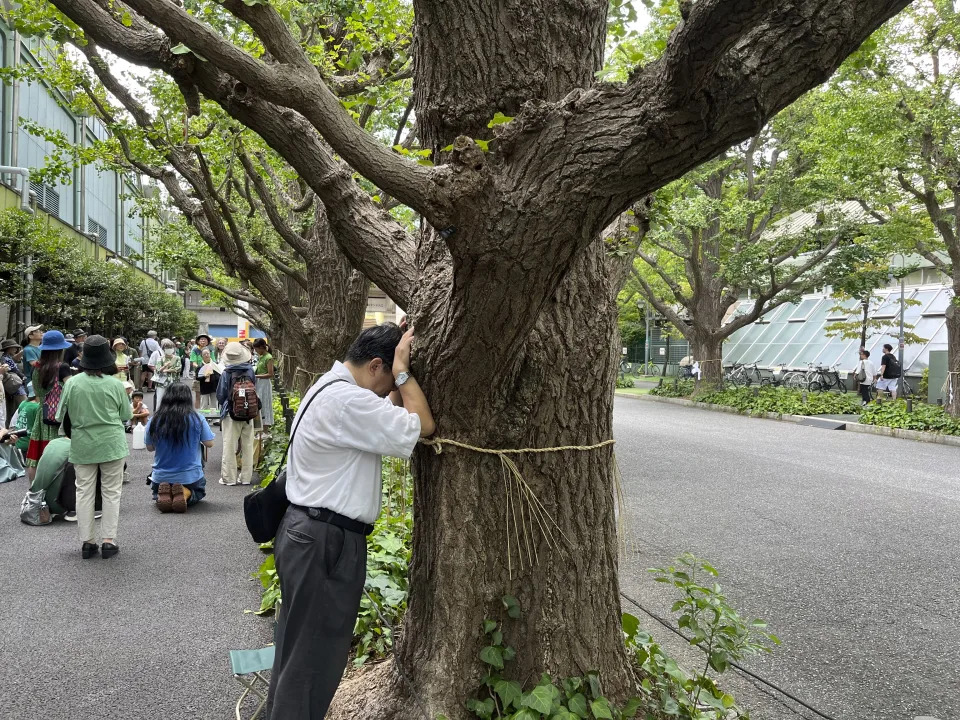
Miho Nakashima has her body painted like a tree by artist Andy Boerger during a public protest on Sunday, Aug. 27, 2023, to point out that 100-year-old trees in the Jingu Gaien park area in Tokyo, Japan, could be cut down under a disputed development plan.
STEPHEN WADE
Sun, 27 August 2023
TOKYO (AP) — Miho Nakashima stood in a two-piece bathing suit in Tokyo on Sunday next to a 100-year-old gingko tree, her body painted head-to-toe in green leaves and brown branches.
Her message was clear, and she repeated it standing at the heart of the Jingu Gaien park area, its sanctity threatened by a disputed real-estate development plan
“I'm a tree,” she said. “Don't chop me down.”
A plan approved earlier this year by Gov. Yuriko Koike would let developers, led by Mitsui Fudosan, build a pair of 200-meter (650-feet) skyscrapers in Jingu Gaien, mow down trees in one of Tokyo's few green areas, and raze and rebuild a historic rugby venue and an adjoining baseball stadium.
Takayuki Nakamura, among a few hundred who gathered on Sunday to protest, pressed his face into the bark of one tree and prayed. The area was set aside 100 years ago to honor Japan's Meiji Emperor.
“I want to appreciate the existence of these trees. Sometime I can feel some sounds inside,” he said.
The planned redevelopment would take more than a decade to finish, and has attracted lawsuits with mounting opposition from conservationists, civic groups, local residents, and sports fans.
Eighteen ginkgo trees behind the rugby stadium are likely to be cut down.
The flashpoint has been trees, green space, and who controls a public area that has been encroached on over the years. Also at issue is the fate of more than 100 gingko trees that line an avenue in the area and provide a colorful cascade of falling leaves each autumn. Botanists say any construction is sure to cause damage.
Critics say the plan has been rammed through despite a botched environmental assessment as real-estate developers take what was intended as public land and turn it into a private commercial venture.
Famous Japanese novelist Haruki Murakami has opposed the plan. And composer and musician Ryuichi Sakamoto sent an open letter to Koike deriding the plan just days before his death on March 28.
The rugby stadium was used during the 1964 Olympics, and Babe Ruth played in 1934 in the baseball stadium along with other American stars facing Japan's best players.
The project highlights the ties among the main actors: the governor, Mitsui Fudosan, and Meiji Jingu, a religious organization that owns much of the land to be redeveloped.
“The redevelopment of the park is obviously a public issue,” Koichi Nakano, a political scientist at Sophia University, told The Associated Press earlier this year. “At the same time, they (politicians) can claim that it is a private decision of a religious organization and the developers.
“But because Jingu Gaien is also a public park with sports facilities, politicians can — and do — meddle in the decisions. Which results in the cozy, probably collusive relationships among the insiders that are unaccountable to the public.”
About 1,500 trees were chopped down in the same area to build the $1.4 billion stadium for the Tokyo Olympics. The Olympics also allowed the city to change zoning laws, which may permit developers to further encroach on the park area.
“This is like building skyscrapers in the middle of Central Park in New York,” Mikiko Ishikawa, an emeritus professor at the University of Tokyo, told The Associated Press.
Developers have argued the two sports facilities cannot be renovated and must be razed.
However, Koshien Stadium near Kobe, built in 1924, has been renovated over the last 15 years, much in the same way that Fenway Park (1912) in Boston and Wrigley Field (1914) in Chicago are still viable for two of MLB's most famous teams.
Meiji Kinenkan, a historic reception hall, dates from 1881 and is still in wide use in Jingu Gaien with no calls from its demolition.
“The development companies are trying to cut down more trees and make a huge business area,” Nakashima said as a leaf was painted on her cheek. “The park has a very long history and should be saved.”
___

Miho Nakashima has her body painted like a tree by artist Andy Boerger during a public protest on Sunday, Aug. 27, 2023, to point out that 100-year-old trees in the Jingu Gaien park area in Tokyo, Japan, could be cut down under a disputed development plan.

Takayuki Nakamura prays against a 100-year-old ginkgo tree that could be cut down under a disputed development plan for in the Tokyo Jingu Gaien park area in Tokyo, Sunday, Aug. 27, 2023. Nakamura, among a few hundred who gathered on Sunday to protest, planted his face in the bark of one tree and prayed. The area was set aside 100 years ago on honor the Meiji Emperor.

The Jingu Gaien park area is seen in central Tokyo, Sunday, Aug. 27, 2023. The beloved green area in under threat from a massive commercial redevelopment plan.

The sign is seen at the entry way of the Jingu Gaien park area in central Tokyo Sunday, Aug. 27, 2023. The beloved green area in under threat from a massive commercial redevelopment plan.

Miho Nakashima has her body painted like a tree by artist Andy Boerger during a public protest on Sunday, Aug. 27, 2023, to point out that 100-year-old trees in the Jingu Gaien park area in Tokyo, Japan, could be cut down under a disputed development plan.

Miho Nakashima, center, has her body painted like a tree by artist Andy Boerger, left, during a public protest on Sunday, Aug. 27, 2023, to point out that 100-year-old trees in the Jingu Gaien park area in Tokyo, Japan, could be cut down under a disputed development plan.




















